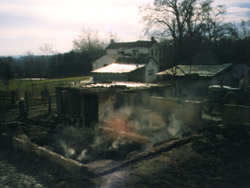|
Fire trucks and thirty volunteers come from four communities. Captain Sears, an electrician by profession, now in charge of an inferno, is shouting instructions. The renters’ Beagle hounds are rushed from the outdoor runs into a garage. Water hoses spray on the “little barn,” soaking hay, making walls steam; it’s only 35 feet from the big barn, seemingly an offspring. The loading chute is already scorched. Family and neighbors throw hundreds of bales to the other side. Dave and cousin John man a hose over the hay and rafters and Captain Sears says that’s forbidden. “That’s why we didn’t ask!”
Four pumper trucks fight flames, leave and refill from the six-inch water line at the Macedonia crossroads. Again and again the red saviors return to the blaze. Township trucks alternate between spewing salt granules on the icy road and frozen driveway. Water runs everywhere, quickly freezes, mocking the intense heat of nearby flames. Police officers stop all traffic to thwart “gawkers”, but Dave’s wife isn’t deterred. She hands over the car keys and trudges across the field toward the blaze and the men of her family.
Everyone is driven in a race against flames, heat, time, and ashes. Firemen, organized, focused, work feverishly; yards and yards of water hoses snake everywhere, yet useless in extinguishing flames fueled by 2500 bales of hay and straw in a century old barn.
Finally, heads give up but hearts hurt; there’s no hope for “Dad’s big barn.” Fire consumes hay and equipment, pigs and unseen critters, gates, hand-hewn timbers, planks and pegs, ladders, doors and lofts; the roof, the walls, and memories, hopes, and history.
Already it’s 3:30 a.m. and other volunteers with oxygen, first-aid kits, and coffee urns are still at the farmhouse, readied in case of injury, feeling deep helplessness. Cousin George stands by as a paramedic, grateful not to be needed. Thankfully the news people don’t arrive to interrupt and sensationalize the sad event — just neighbors parked on the roadside and in the yard, staring with guarded awe at the disaster.

The smoldering ruins of the barn.
December 28, 1999
|
Dave is drenched, moving in frozen clothes, cold and coughing from soot and fumes. Taking a pause after five hour’s work to save the little barn, he’s telling the firemen to go home and leave the big barn to smolder so there’s not as much to clean up. Flames will continue for three days, and ultimately grotesque, charred chunks and fragments surrender to combustion.
The tin roof, stanchions and burned equipment will be hauled to salvage; two foot piles of ashes — cinders and baked, blackened concrete and stone, crumbling when kicked — will be put in the farm’s dump.
Time to shoot two more pigs with broken legs and take them to the slaughterhouse; time to let the burned animals be with the rest of the cinders; time to be grateful that no person was hurt; time to consider the wisdom of the elders who put the 6” line at the crossroads for the water supply; time to breathe air away from smoke and tragedy. Time to become calm, call family and feel the happenings.
My call came in early morning, I listened with shock and dread, and I could hear the extreme weariness in Dave’s voice. Absorbing the frightening details, I asked, “Do you know that yesterday would have been Dad’s 85th birthday?” Dave, surprised, just said, “I have my answer.” I didn’t probe his response. I still wonder what kind of message “Dad, the farmer” was sending. But the big barn has not been replaced, and there are no more pigs.
By Thelma Marie Wurzelbacher Columbus, OH, January 2003
Posted February 1, 2003.
|

![]()
![]()

![]()
![]()